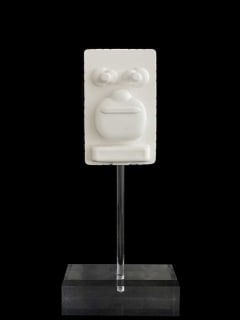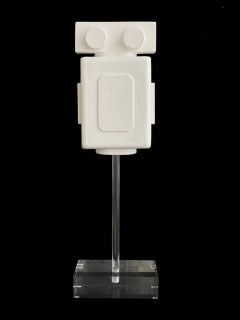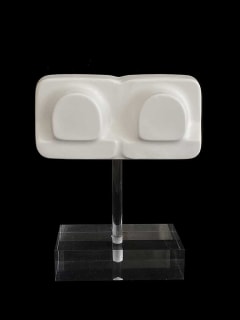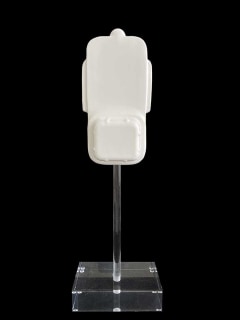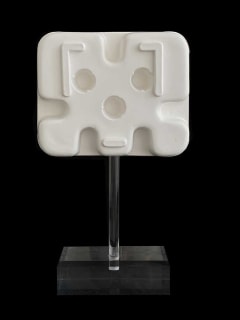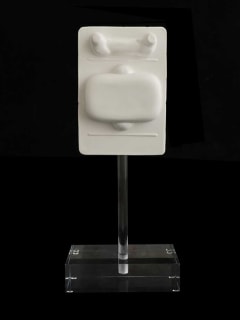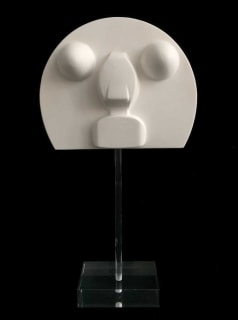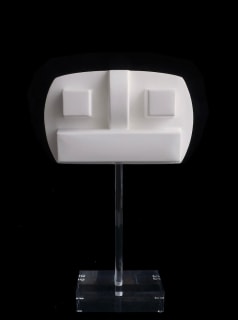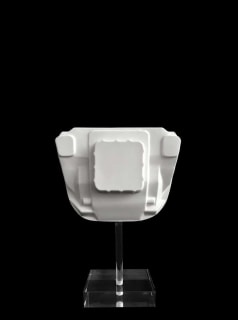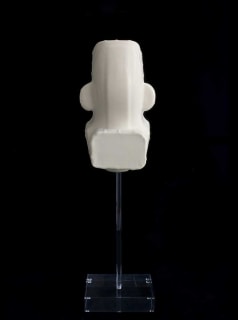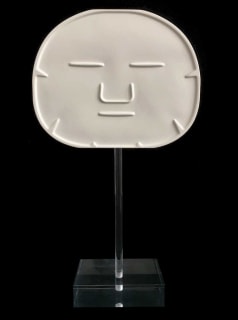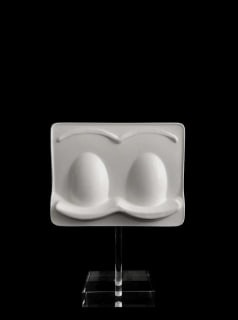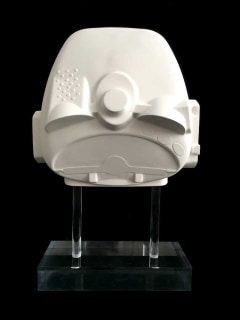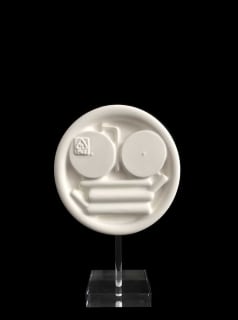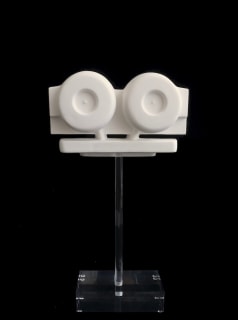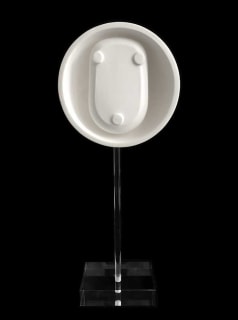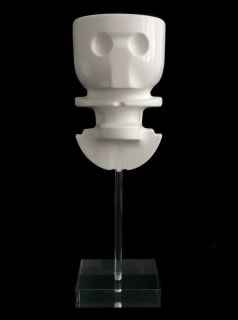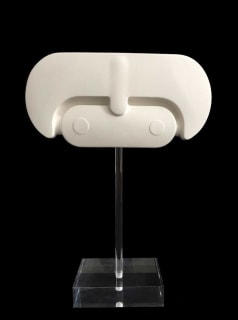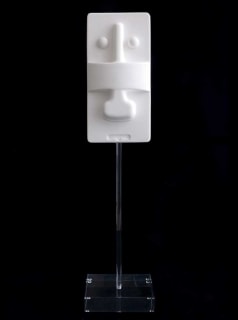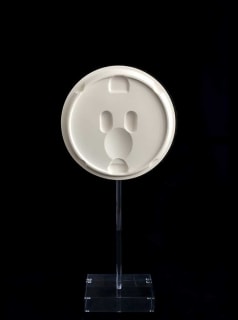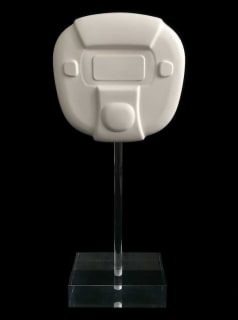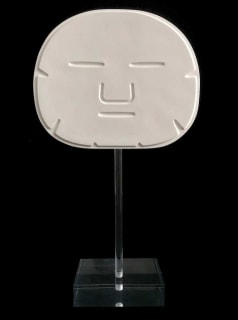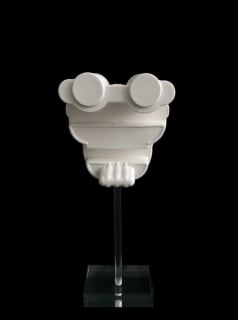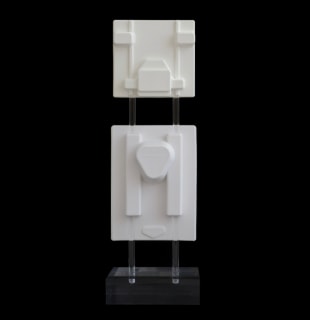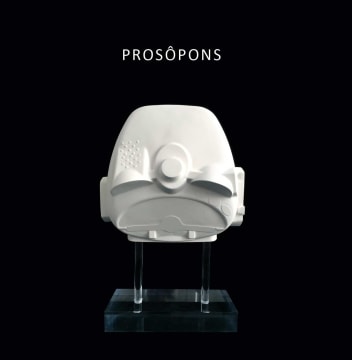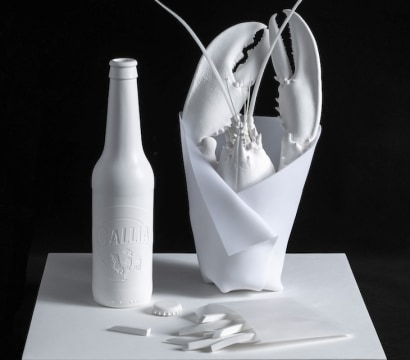
Pour cette nouvelle exposition personnelle, Angélique présente une série de masques en plâtre acrylique, intitulée "Prosôpons", directement tirés d’emballages de produits manufacturés a priori sans intérêt. Issu du théâtre grec, ce terme signifie à l’origine aussi bien "visage" que "masque", l’étymologie soulignant l’idée de face où se trouve l’organe de la vue et l’apparence externe de choses inanimées.
A l’inverse de ses œuvres en organdi exigeant un grand savoir-faire, ces sculptures n’ont nécessité aucune intervention autre que la fabrication d’un moule par Angélique. Ce transfert dans le champ artistique opère une transmutation sérendipienne, changeant un rien en quelque chose, un objet sans qualité en masque anthropomorphe. Leurs organes démesurés, géométriques ou inversés étonnent par leur filiation hybride avec les fétiches d’Art premier et les créations androïdes des nouvelles technologies. Ils semblent tout aussi chargés d’une fonction symbolique ou rituelle incertaine. Si l’intention initiale de l’artiste vise à s’interroger sur l’esthétique des produits d’emballage, sa démarche ne manque pas de faire écho au ready-made – en forme d’empreinte dans le cas présent – et à l’esprit Dada. Pour paraphraser Max Ernst, "Attention: un masque peut en masquer (ou démasquer) un autre", les idoles d’Angélique offrent de multiples niveaux de lecture. Ils sont survivance du caractère magique de l’art, interrogation sur nos modes de consommation et incertitude sur notre devenir à l’ère de la robotisation. Et bien d’autres choses encore...
Née en 1957 (France), Angélique est photographe et sculptrice, utilisant différents matériaux (polytéréphtalate d'éthylène, résine acrylique) ou l’organdi - une fine trame de coton - à partir d’un travail traditionnel de patronage, de couture et de broderie. Son œuvre est régulièrement montrée dans des institutions publiques et fait partie de plusieurs collections, comme celles du FRAC Normandie Rouen.
_____
This new solo exhibition of Angélique is focused on a series of masks in acrylic plaster, entitled "Prosôpons", directly taken from blister packagings of manufactured products that are a priori uninteresting. From the Greek theater, this word originally means both "face" and "mask". Its etymology emphasizes the idea of face, organ of sight, and the external appearance of inanimate things.
Unlike her organdy works that demand great skill, these sculptures required no other intervention than the making of a mold by Angélique. This transfer into the artistic field operates a serendipian transmutation, changing a mere thing into something else, an object without quality into an anthropomorphic mask. Their disproportionate, geometric or inverted organs amaze with their hybrid connection with fetishes of Ethnographic Art and the android creations of new technologies. They also seem to be charged with an uncertain symbolic or ritual function. If the initial intention of the artist was to highlight the aesthetics of packaging products, her approach also echoes the ready-made - in the form of an imprint in this case - and the “Dada” spirit. To paraphrase Max Ernst’s sculpture "Warning: one mask can hide (or unmask) another", Angelique's idols offer multiple levels of reading. They are the survival of the magical nature of art, questions about our consumption patterns and uncertainty about our future in the era of robotization. And many more things...
Born in 1957 (France), Angélique is a photographer and sculptor, using different materials (polyethylene terephthalate, acrylic resin) or organdy - a fine cotton weft - from a traditional work of patronage, sewing and embroidery. Her work is regularly shown in public institutions and is part of several collections, such as those of the FRAC Normandie Rouen.
_____
Adresse/Location
48 rue Chapon
75003 Paris

